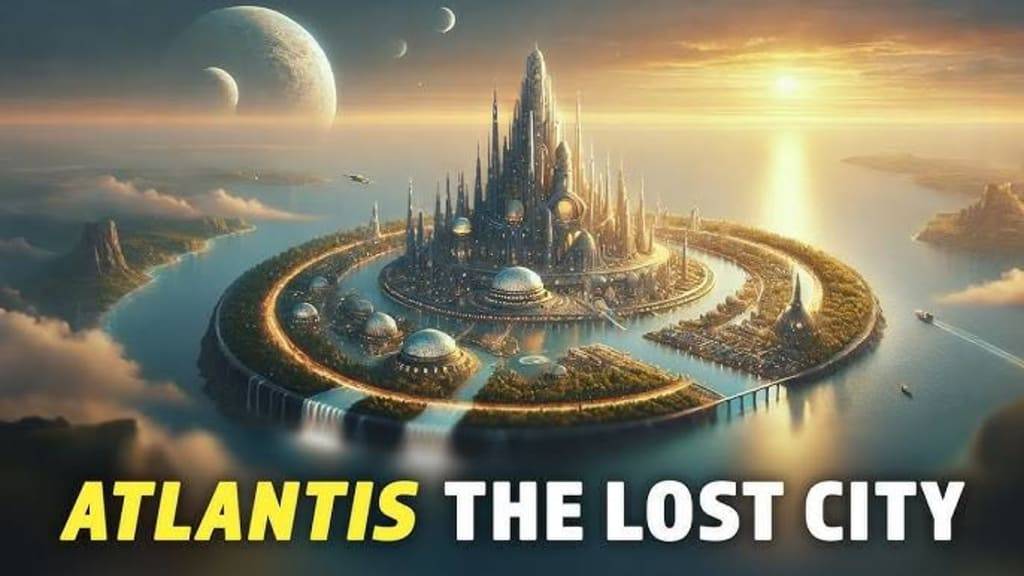For thousands of years, the legend of Atlantis has captivated people around the world. Atlantis, described as a large, technologically powerful civilization that mysteriously vanished beneath the sea, has inspired endless speculation and myth-making. From ancient texts to modern cinema, the story of Atlantis continues to captivate. But what is the true story behind this mythological city, and why has it remained so fascinating?
The Origin of the Atlantis Legend
Plato, an ancient Greek philosopher, made the first mention of Atlantis. In his dialogues *Timaeus* and *Critias* (about 360 BCE), Plato presents Atlantis as a powerful and rich civilization that existed 9,000 years before his own. Atlantis, located beyond the "Pillars of Hercules" (today's Strait of Gibraltar), was a vast island with concentric rings of land and ocean. Its inhabitants were highly advanced, with a thriving culture, a powerful fleet, and stunning architecture. At its peak, Atlantis was a utopia, but moral degradation led to its fall. Finally, the gods punished Atlantis, causing it to sink into the ocean.
Plato's fable was most likely written as an allegory on the pitfalls of hubris and the fate of civilizations that lose their virtue. But many have wondered whether Atlantis was based on a real event or location.
Theories Regarding Atlantis' Location
For ages, people have debated where Atlantis might have been located. Some believe Plato's descriptions are solely symbolic, while others argue they refer to a genuine location. Several explanations have been offered over the years.
1. The Mediterranean Theory
Santorini (ancient Thera), a Mediterranean island, is one of the most popular destinations. Around 1600 BCE, a volcanic explosion triggered catastrophic tsunamis that may have devastated the Minoan civilization. Some theorists believe that the Minoans, who were decimated by this eruption, originated the Atlantis story.
2. The Caribbean Hypothesis.
Another idea argues that Atlantis was located in the Caribbean, with some pointing to the island of Cuba. This idea holds that a cataclysmic disaster such as a meteor impact or seismic activity caused the city to fall beneath the waves.
3. The Antarctica Theory.
Some have proposed that Atlantis was in Antarctica. According to this scenario, the continent may have drifted southward when the Earth's crust shifted, drowning Atlantis beneath the ice. However, mainstream science is skeptical of this hypothesis, as there is insufficient data to back it up.
4. The Azores Theory.
Other supporters argue that the Azores Islands in the North Atlantic could be the remains of Atlantis. These islands are close to the coordinates Plato gave, and some think they represent the sunken peaks of an ancient civilization.
Atlantis: Myth and Culture
Although the historical truth of Plato's account is debatable, the story of Atlantis has had a lasting impact on culture, literature, and popular imagination. Ignatius Donnelly, a 19th-century scholar, embraced the story of Atlantis, claiming that it was a real, advanced civilization that affected ancient societies around the world. His book *Atlantis: The Antediluvian World* (1882) sparked interest in the theory that Atlantis contributed to agriculture, metallurgy, and other technologies.
In recent times, Atlantis has become a major motif in literature and film. Movies like *Atlantis: The Lost Empire* (2001) and the TV series *Stargate Atlantis* (2004-2009) continue to investigate the mystery and attraction of this legendary metropolis. These portrayals keep the dream of Atlantis alive, capturing the imaginations of fresh generations anxious to discover its mysteries.
The Enduring Fascination
The tale of Atlantis continues for a variety of reasons. It appeals to the common human thirst for vanished civilizations and ancient wisdom. The concept of a society that thrived with advanced technology just to mysteriously vanish speaks to our fascination with the unknown. Atlantis is both a picture of human potential—an idealized world where knowledge and harmony reign—and a warning about the dangers of excess and moral decay.
Furthermore, the narrative of Atlantis reflects the alluring notion that there may be ancient wisdom waiting to be uncovered, lying beneath the waves or buried under thousands of years. Whether Atlantis existed or not, it implies that the Earth may contain forgotten mysteries waiting to be discovered.
Conclusion
While the existence of Atlantis is unverified, the narrative continues to enchant people all around the world. Whether interpreted as a cautionary tale, an allegory, or a lost civilization, Atlantis remains one of the most enduring and fascinating stories. It reminds us of the fragility of civilizations, the appeal of ancient wisdom, and the age-old human yearning for solutions to our past puzzles.
In the end, perhaps the true appeal of Atlantis is not revealing its ruins but rather the path of exploration itself—the never-ending search for hidden truths about our world and our place within it. The narrative of Atlantis may never be entirely explained, but its legacy will undoubtedly continue to captivate imaginations for years.




No comments yet
Be the first to share your thoughts!